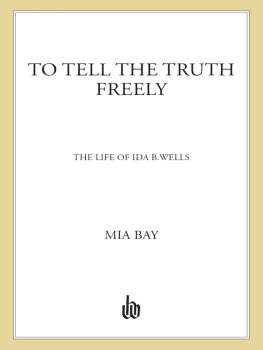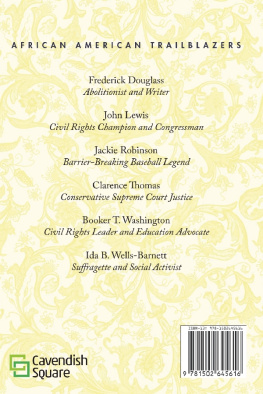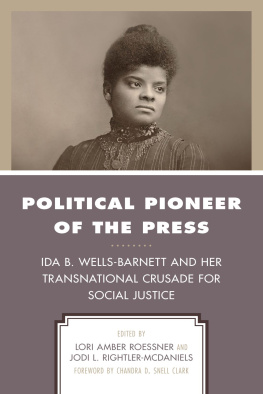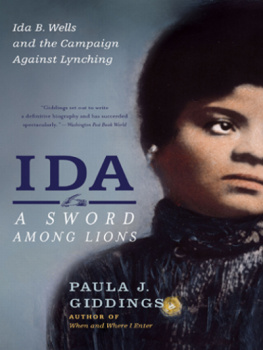Introduction:
If Iola Were a Man
AS THE NINETEENTH CENTURY CAME TO A CLOSE, A YOUNG African American woman named Ida B. Wells was acclaimed the most widely known woman of her race in the world. Born a slave in Civil Warravaged Mississippi, Wells achieved freedom with emancipation, and international renown in the 1890s, when she rose to fame as a journalist, speaker, and civil rights activist who led an international crusade against lynching. She was just thirty years old when she first began her campaign to end the brutal white-on-black mob violence that took the lives of at least 3,220 African American men, women, and children between 1882 and 1930a period that marks the high tide of this violence. Wells would remain an antilynching crusader all her life, with good reason. During much of it, lynching was so popular in the South that it was commemorated in postcards featuring the dead black bodies hanging from trees, bridges, and streetlights. And even outside of the South, the mob violence went almost wholly unchallenged until Wells began her antilynching crusade. The lynch mobs victims, usually both black and male, were sometimes accused of rape, and invariably condemned as criminals after the factalthough they were put to death without judge or jury. As the postcards advertising these lynchings testify, the practice was not covert. Instead, it was the work of white mobs who displayed dead African American bodies to underscore their continuing racial dominion over a people only recently freed from slavery.
A member of that new generation of ex-slaves, Ida B. Wells came of age at a time when her people needed aggressive leaders who could combat the erosion of black civil and political rights that accompanied the end of the Reconstruction era. By the late nineteenth century, the voting rights, political power, and social freedoms that African Americans had won when the South was first reconstructed after the Civil War were under assault. Anxious to restore the white supremacy that slavery had once guaranteed, white Southerners used mob violence, political terrorism, and election fraud to drive the freed people and their Republican allies out of politics. What came next was a Jim Crow South, where few African Americans voted, and all were subject to segregation and many other forms of legal and economic discrimination. While white Southerners called the end of Reconstruction a blessed Redemption, among African Americans it represented a devastating setback in the struggle for freedom that dated back to slavery. Moreover, it came at a time when many of the black leaders who had led that struggle were too old to head the new battle now needed to protect emancipations freedoms. A new generation of black leaders was needed, and Wells would become one of them.
Born to slave parents in 1862, she had defied remarkable odds before she ever embarked on her antilynching campaign. Orphaned at age sixteen when her parents died in the yellow fever epidemic that swept the Mississippi Valley in 1878, she raised her five younger siblings by herself, taking a teaching job in a rural school that same year. Her own education remained incomplete as a result, but Wells pursued a tireless course of self-education, reading and writing her way into a career in journalism under the pen name Iola. By her late twenties, Wells had become one of the preeminent female journalists of her day, and the editor and co-owner of the Memphis, Tennessee, newspaper Free Speech and Headlight . Now widely acclaimed as Iola, the Princess of the Press, Wells saw her career almost derailed in the spring of 1892, when a white mob lynched three black businessmen in Memphis. Shocked by the violence and mourning the death of three men she had known for years, one as a close friend, Wells protested the murders.
She also began an investigation of lynching that would last a lifetime and see her exiled from the South. The three men who died in Memphis had committed no crime other than to open a store that challenged a nearby white-owned business. Accordingly, their deaths inspired Wells to research the causes of lynching. White Southerners justified lynching as a necessary check on the horrible and beastly propensities of the black race. Black men were prone to the crime of rape, they insisted. Only the most prompt, speedy and extreme punishment could prevent them from preying on weak and defenseless [white] women.
After she left Memphis Wells launched an antilynching campaign that took her from Tennessee to New York, Great Britain, and Chicago, and garnered her new acclaim as one of the most forceful African American leaders of the day. Her antilynching campaign, as one contemporary commentator noted, addressed the most urgent issue facing black America at a time when none of our representative and most prominent black men would take up the lead. Another deemed her the only successor to Frederick Douglassthe former fugitive slave who became black Americas great antislavery leader. As such observers were well aware, the two black leaders had much in common. Both were editors, both were orators, and both began their careers passionately committed to righting the worst forms of injustice that, in their respective times, were inflicted on their people, writes Douglass biographer William McFeely. In his seventies by the time they met, Douglass served as both a mentor and a role model to Wells, whose antilynching campaign mobilized some of the same international reform networks Douglass had once rallied to the antislavery cause.
The British, in particular, had lent powerful moral authority and financial support to the abolitionist movement. They proved a crucial audience for Wells, who, at the beginning of her campaign, had trouble even gaining a hearing among whites at home. American whites in both the North and the South chose to regard lynching as a Negro problem largely brought on by the criminal character of the race, but the British proved more receptive to Wellss well-researched analysis of its true causes. Moreover, they were also supportive when Wells asked them to once again champion the unrealized liberties of the freed peoplejust as they had supported their emancipation. The result was the formation of a much publicized British Anti-Lynching Committee, which shamed a number of American states into drafting, and in some cases even passing, antilynching legislation, and fostered an Anglo-American discussion of lynching that made headlines in both countries.
Lynching did not end in the 1890s, or for many years to come. But Wellss campaign transformed lynching from a practice that went largely uncontested even among Northern whites into an ugly symbol of the racial injustices of Jim Crow. Not the first African American to speak out against lynching, Wells was the first to gain a broad audience. Her work is notable for crafting an analysis of lynching that remains pathbreaking even to this day. In challenging the practice, Wells cut through the myths about black rapists that white Southerners used to defend lynching. Lynching had nothing to do with rape and everything to do with power, Wells argued, presenting the facts and figures to prove it. White men policed the color line even to the point of murdering black men who engaged in consensual relationships with white women, and most lynchings did not involve allegations of rape. Instead, lynchings sustained the all-encompassing system of racial domination that marked the New South by terrorizing blacks and keeping the nigger down.











